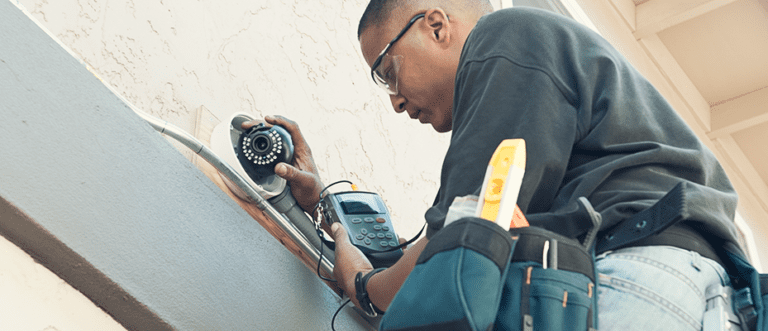
Pros

No extra fees

No wires (perfect for renters)

No strangers in your home

No contracts, usually

Cons

You do the work

No professional expertise

Higher up-front equipment costs

Bigger houses take longer
Whether it’s painting a bedroom or installing a security system, doing it yourself is a great way to save money and maybe learn something new about home security. Still, even if you take pride in doing odd jobs around the house, it’s helpful to know what you’re getting into before you install a security system.
Without exception, modern security systems (even professional ones) use wireless sensors, so you don’t need to tangle yourself in a heap of wiring. If a device needs wires, it’s usually nothing more than a power cable you plug into a wall outlet.
Power up
The most common DIY devices with power cables are the security camera, control panel, and base station. Thermostats are trickier to install, but DIY security companies don’t usually sell these. Unless a company says otherwise, you can expect wireless equipment for the rest of your system.
Almost every basic component in a burglar alarm is surprisingly simple to install. It’s about as easy as changing a lightbulb or hanging a picture frame on the wall. Here are the basics:
- Most DIY security companies pre-program devices before shipping to save you time and stress.
- DIY sensors use an adhesive pad to stick to the wall or door. You don’t need to drill holes—you simply put your sensors and control panel in place and activate the system.
- Some devices, like smart locks, require a little more work to install, but you can usually do this with a screwdriver in 15 minutes or less in our experience.
Pro tip
DIY doesn’t mean you’re alone—if you run into trouble, most companies with DIY installation let you speak over the phone or chat online with a technician.
The real trickiness with DIY security starts when you realize that you’re installing more than one device. Essentially, security system installation is more of a time commitment than a complex operation.
Based on our own experiences, it takes about an hour to install a DIY system, unless you live in a particularly large house.
It’s your schedule with no fees
Another perk is having full control of your time, rather than scheduling around a technician—and it comes with the bonus of not inviting a stranger into your home or paying an installation fee.
While you sidestep installation fees with DIY security systems, you might pay a small activation fee to get intrusion detection monitoring up and running after setup.
With most do-it-yourself home security companies, you own your security equipment from the start. This means a bigger up-front expense, but it also means it’s easy to take your system with you if you move.
Equipment ownership and wireless design make DIY home security systems the best home security solution for renters.
If you don’t want to pay for equipment right away, some DIY security companies (like Frontpoint) offer consumer financing plans.
There’s usually no contract with DIY install alarm systems, making it an even better deal for renters. You pay for monitoring only when you want it. Depending on the company, you might get monitoring by calling customer support, logging into your account online, or tapping away in the mobile app.
Some companies with DIY installs still require a contract including Link Interactive and Alder.
Still, DIY installation isn’t perfect for every situation. You’re probably not a security expert, and that means you may struggle to know if you set up your equipment correctly.
And even though you can live-chat or talk to a professional over the phone, they can’t see inside your home to make specific recommendations that an in-person installer could.
DIY home security systems come with the risks of improper equipment placement and missing security vulnerabilities a pro would catch. Check out our home safety and security checklist if you want help spotting gaps in your security.
DIY installation companies
If you love the idea of DIY installation but aren’t sure where to start, take a look at out our reviews of DIY home security solutions like Frontpoint, SimpliSafe, and Abode, and Ring security.









